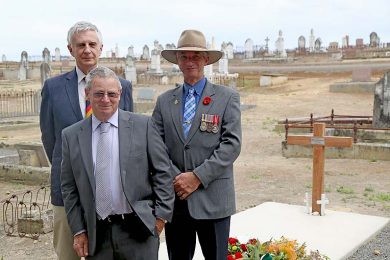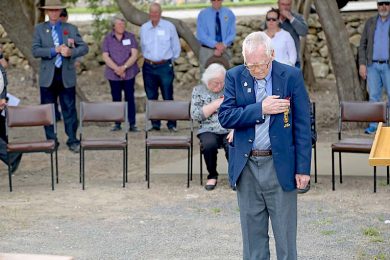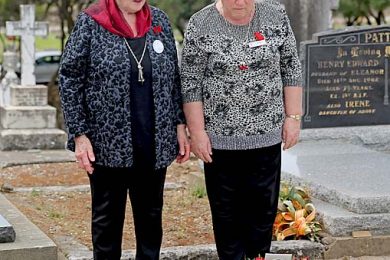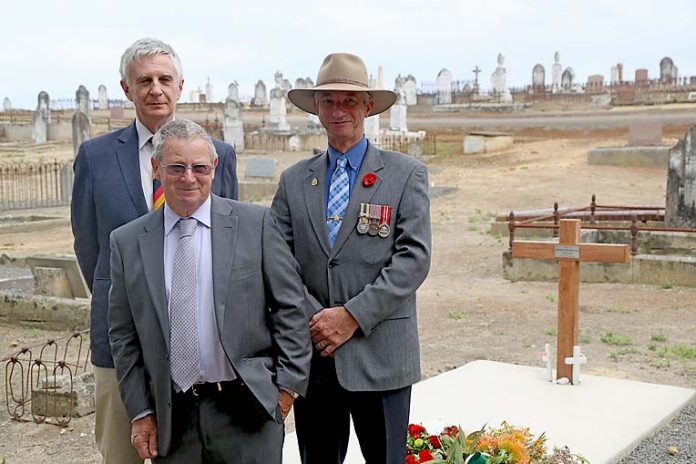
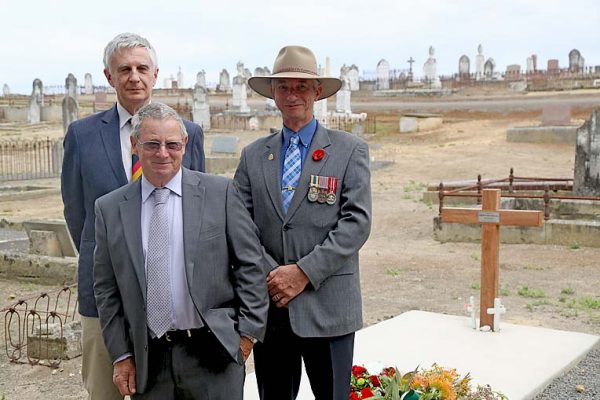
THE graves of two fallen soldiers have been honoured and blessed during a rededication ceremony held at the Millicent Cemetery this month.
South East Family History Group (SEFHG) president Noel Boyle conducted the service, which was attended by around 30 locals, including members of the Millicent RSL (RSL), Millicent Lions Club, Legacy Ladies, SEFHG, Wattle Range councillors and Member for MacKillop Nick McBride.
Mr Boyle shared the stories of the two soldiers – Hector George Gillis, who fought in the Boer War and Francis Athol Love, who fought in World War I – with those attending.
Hector Gillis was born in Rendelsham on December 10, 1878 and was consigned to the Fifth Contingent Imperial Bushmen when the South African War (Boer War) broke out in 1901.
His records state he was five feet and five and a half inches and was recommended as a “general station hand, can ride well and a fair shot”.
Mr Gillis set sail from Port Adelaide on February 9, 1901 and arrived in Cape Town after a 38 day journey.
When they arrived, the bubonic plague was rife and no one was permitted ashore and they proceeded to Port Elizabeth before they were allowed to disembark.
On Easter Sunday, the troupe moved out to confront the Boer Soldiers.
Mr Gillis wrote a number of letters to friends back home, which were published in the then Millicent Times and it appeared he was in the thick of the fighting.
The only other information the SEFHG had on his military service is when the fifth and sixth South Australian Imperial Bushmen arrived home in May 1902 the papers of the day reported Trooper Gillis was still in hospital in South Africa.
Upon returning home, Mr Gillis had a short stay in the Millicent district before moving to New Zealand and Western Australia.
In 1912, he came back to the South East and worked as a shearer in Furner, where he remained until 1915 when he enlisted for service in the Great War.
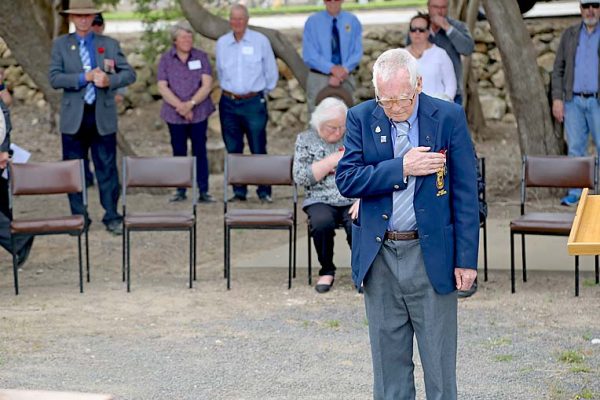
When he enlisted on June 28, he stated he had spent two years in the Millicent Light Horse and 15 months in the South African War.
He served in Egypt in the 9th Light Horsemen Regiment 1292 for four and a half years.
In August 1916, Mr Gillis was wounded, necessitating three months in hospital and he was discharged from the army three years later.
With the war over, he returned to Furner and resumed work as a shearer.
In February 1935, he became ill and was admitted to the Adelaide Hospital for an operation.
Mr Gillis returned to Furner, but after a number of operations he never fully recovered and died in the Mount Gambier Hospital on July 26, 1936.
Meanwhile, Captain Love was born in Falkirk Scotland during the year 1900, however he only lived there for three months.
He was one of a family of six sons and 11 daughters, however sadly his father and sisters passed away following the great plague in 1903, which swept Karachi.
Mr Love enlisted as a drummer in the Black Watch when he was 12 years old and later became one of the regimental pipers.
He was between 14 and 15 years of age when his regiment was ordered to France and went up to Mons with the first of the British troops to march to the help of the Belgians.
According to the February 12, 1929, edition of The Border Watch, Mr Love witnessed three of his brothers “blown to pieces” by shrapnel and a piece of the same shell wounded him severely.
His other two brothers were posted as missing and were never heard of again.
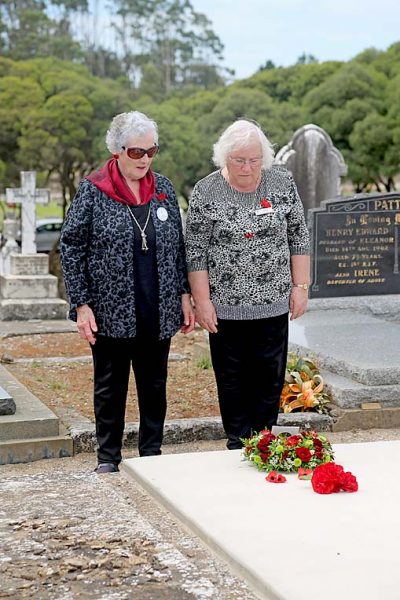
Mr Love recovered at Aldershot Military Hospital and returned to France, where at Passchendaele in 1918 he was stabbed in a hand-to-hand bayonet fight.
The weapon pierced his liver and after another stint in hospital he returned to the lines.
However, he was involved in another burst of shrapnel and never fully recovered from wounds he received.
For 10 years and three months he was treated at Aldershot to be discharged as permanently incapacitated with an Imperial pension of 2/6 per day.
When his mother fell ill, Mr Love drew his pension and travelled to Australia to visit her.
After lending a considerable sum of money to an Australian soldier who lived near Beachport, Mr Love decided he would “look the man up”.
He was unable to find anyone who knew anything of the man he was looking for and ill-health compelled him to seek medical attention at Millicent.
An operation offered some relief, but the doctor was not satisfied with the result and enlisted the professional interests of doctors King and Lorimer of Mount Gambier.
A further operation was decided on and was performed immediately.
Mr Love told the doctor he lost count of how many surgical operations he had undergone after he reached the 65th.
He died at the Thyne Memorial Hospital in Millicent at 29 years of age from internal obstruction.
Also speaking at the rededication ceremony was doctor Tony Stimson, president of the South Australian Boer War Association.
He too spoke briefly of the lives of the two fallen soldiers, as well as about the war.
Paul Hales was the officiating chaplain at the event and piper Major Ed Coventry played the bagpipes.
Millicent RSL president Chris Mathias recited the Ode of Remembrance and those attending observed a minute of silence before having the opportunity to lay wreaths in tribute.
Mr Boyle thanked Major Nathan Klinge from RSL Care South Australia for his support, which allowed the project to go ahead and Lions club member Leon Miles made the redgum crosses for the graves with locally sourced timber donated by Wally Lang.


